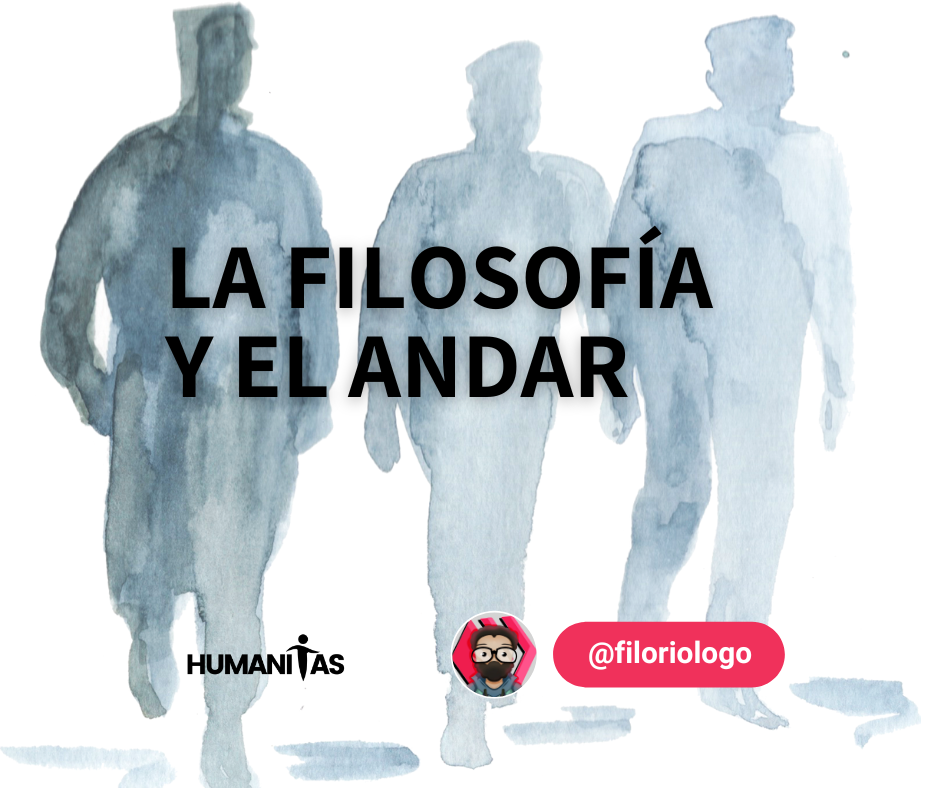¿Acaso la filosofía tiene que ver con el caminar?
Pareciera que no tuviera nada que ver una cosa con la otra, pero, realmente el ejercicio de la filosofía tiene todo que ver con el andar. Recientemente he descubierto un texto con el que he re-aprendido a mirar lo obvio. Por lo que debo admitir que he recobrado ese sentido filosófico que se trata de pensar lo cotidiano, lo que se da por sabido. En lo cotidiano hay modos de ser, o quizá eso podría decir Heidegger. Quienes me conocen saben que una de las cosas que más disfruto hacer es dar paseos, salir a caminar sin pretender ir a un lugar en específico, y aunque muchas veces lo hago con la intención de despejar la mente o rumiar alguna idea, no había pensado en la relación que podemos encontrar entre el caminar y el filosofar.
En este sentido he encontrado un texto llamado “Los filósofos del paseo” de Ramón del Castillo y aunque aun no termino de leerlo por completo, no me podía callar los dedos y quería darle forma, por lo menos un poco a los pensamientos que han comenzado a andar peripatéticos en mi espíritu con el inicio de esta lectura. Debo confesar que he encontrado cierta fascinación en los párrafos en donde ya he posado la mirada.

Por responsabilidad y criterio no me permitiría arrojar alguna conclusión apresurada sobre las disertaciones entre el filosofar y el caminar, no todavía mientras no culmine la lectura. No por ello quedo impedido de manifestar mi lugar epistemológico frente a las preguntas que devienen del texto, además de expresar mi sorpresa al encontrarme filósofos de quienes me considero un aprendiz y tras encontrarme con sus ideas en sus textos confieso he sido persuadido, aunque sea solo en parte me han influenciado, y que en este sentido nunca los había pensado en función de su propuesta filosófica y el caminar. Al los únicos que había considero pensar en relación pensamiento-andar han sido, Aristóteles pero eso es realmente obvio, también a Epicuro en su jardín, a los estoicos por su encontrarse en la urbe, sabiendo que su natividad en el pórtico de las pinturas en la antigua Grecia, pero por lo menos, nunca habría pensado a Heidegger o NIetzsche en este sentido, mucho menos a Kant, Hegel, Sartre o Adorno.
En el andar sobre los párrafos me he topado citas y pasajes que me han hecho profundizar poderosa y detenidamente, a pesar que la lectura es ágil y hecha para cualquier tipo de lector, sobre las ideas filosóficas es preciso detenerse, y me gustaría compartir de manera preliminar algunas de las ideas con las que me he detenido, tanto por el sentido de la misma como por mi identificación espiritual con la misma, como amante del discurrir filosófico como amante del andar.
“Andar nos predispone para la metamorfosis de nuestra mirada sobre el mundo” 1*
“El caminar “ofrece una bella imagen de la existencia, siempre inacabada” 2
Estas citas extraídas del texto de Ramón del Castillo que a su vez han sido tomadas de un texto de Breton, son a mi parecer, dos ideas que expresan muy bien lo que implica el caminar. Por un lado es poseer una cosmovisión y por otro asumir una realidad indeterminada.
Para concluir este breve artículo, me gustaría decir que estoy disfrutando enormemente de la lectura del libro y estaré publicando reflexiones de estos filósofos del paseo.
1 Le Breton, Elogio del caminar, Madrid, Siruela, 2011, pp. 62-64. *2 Ibíd p. 59
ENGLISH VERSION
ENGLISH VERSION (click here!)
Philosophy and walking Does philosophy have anything to do with walking? It would seem that the two have nothing to do with each other, but in reality, the practice of philosophy has everything to do with walking. I recently discovered a text that has taught me to look at the obvious with fresh eyes. I must admit that I have rediscovered that philosophical sense of thinking about the everyday, about what is taken for granted. In everyday life, there are ways of being, or perhaps that is what Heidegger would say. Those who know me know that one of the things I enjoy most is going for walks, going out without any specific destination in mind, and although I often do so with the intention of clearing my mind or mulling over an idea, I had not thought about the relationship between walking and philosophizing. In this regard, I have found a text called “Los filósofos del paseo” (The Philosophers of the WalLa filosofía y el andar. In this regard, I have found a text called “Los filósofos del paseo” (The Philosophers of the Walk) by Ramón del Castillo, and although I have not yet finished reading it completely, I could not keep my fingers quiet and wanted to give shape, at least a little, to the thoughts that have begun to wander in my spirit with the beginning of this reading. I must confess that I have found a certain fascination in the paragraphs I have already read. Out of responsibility and discretion, I would not allow myself to jump to any hasty conclusions about the dissertations on philosophizing and walking, not until I have finished reading. This does not prevent me from expressing my epistemological position on the questions that arise from the text, as well as expressing my surprise at finding philosophers whom I consider myself an apprentice to. After encountering their ideas in their texts, I confess that I have been persuaded, even if only partially influenced, and that in this sense I had never thought of them in terms of their philosophical proposal and walking. The only ones I had considered in relation to thought-walking were Aristotle, but that is really obvious, Epicurus in his garden, and the Stoics for being in the city, knowing that they originated in the portico of paintings in ancient Greece, but at least I would never have thought of Heidegger or Nietzsche in this sense, much less Kant, Hegel, Sartre, or Adorno. As I read through the paragraphs, I came across quotes and passages that made me think deeply and carefully, even though the book is easy to read and suitable for any type of reader. When it comes to philosophical ideas, it is necessary to pause and reflect, and I would like to share some of the ideas that caught my attention, both because of their meaning and because of my spiritual identification with them, as a lover of philosophical discourse and a lover of walking. “Walking predisposes us to a metamorphosis of our view of the world”*1 “Walking offers a beautiful image of existence, always unfinished”** These quotes, taken from Ramón del Castillo's text, which in turn were taken from a text by Breton, are, in my opinion, two ideas that express very well what walking implies. On the one hand, it is about having a worldview and, on the other, accepting an indeterminate reality. To conclude this brief article, I would like to say that I am greatly enjoying reading the book and will be publishing reflections on these philosophers of walking. *Translated with DeepL.com (free version)* *1 Le Breton, Elogio del caminar, Madrid, Siruela, 2011, pp. 62-64. ** Ibíd p. 59
*** *Si deseas apoyar mi trabajo acá puedes enviar un tip* *If you wish to support my work here you can send a tip.* *** - Bitcoin *Lightning Network*: filoriologo@sats.v4v.app - Bitcoin: 1Sarz4FYPMDGmEUL8DsAQYHKZSVazAaFk - BINANCE ID: 4072493  | [X](https://x.com/FiloRiologo?t=KwqSCxo_stO89jFXp1QBoQ&s=09) | [Instagram](https://www.instagram.com/filoriologo?igsh=cW9nYm9jN3V4aGky) | [Medium](https://medium.com/@filoriologo) |[Telegram](t.me/filoriologo) | [LinkedIn](https://www.linkedin.com/in/cesar-díaz-885a0a183/) | [INLEO](https://inleo.io/profile/filoriologo/blog) |